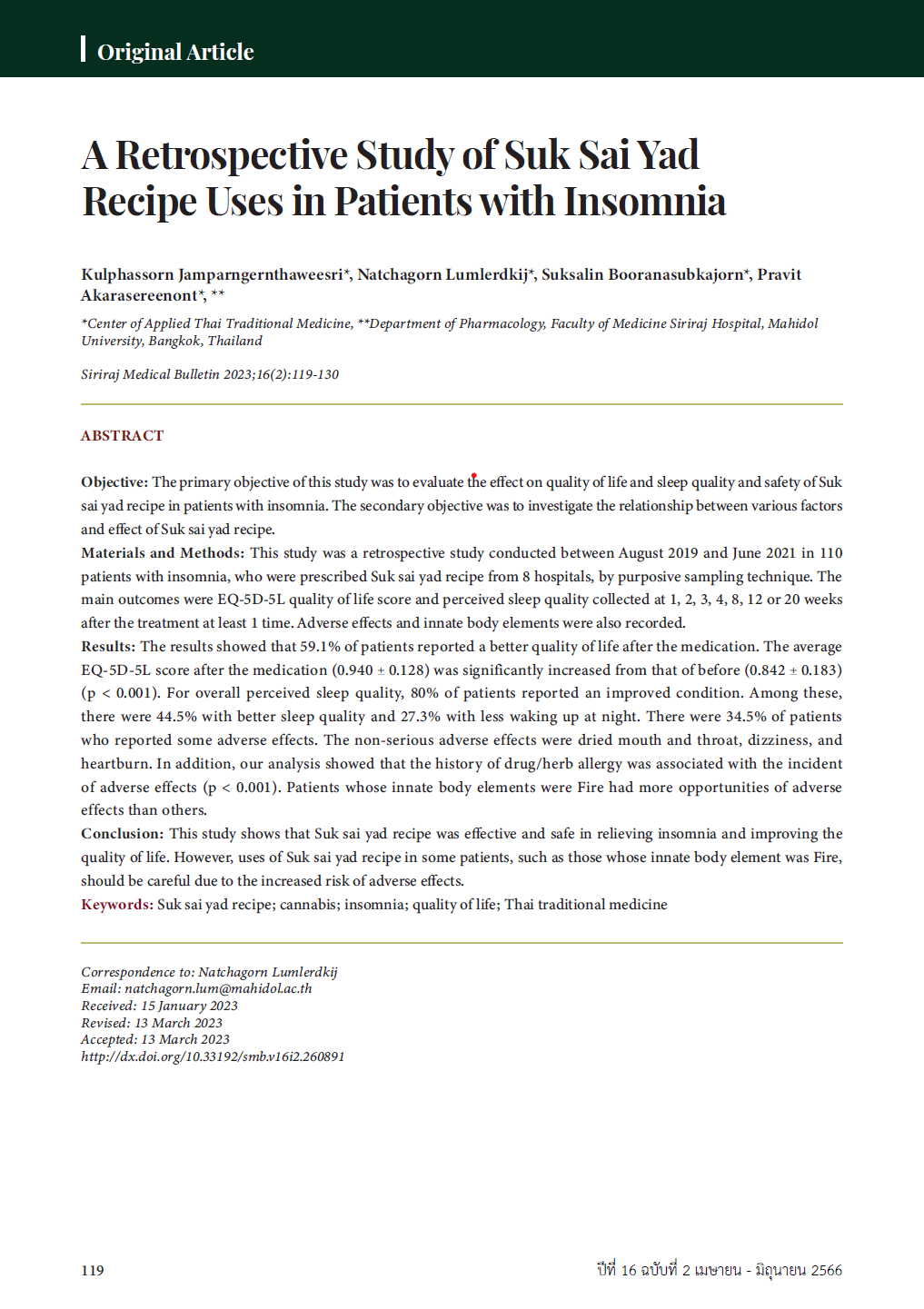A Retrospective Study of Suk Sai Yad Recipe Uses in Patients with Insomnia
Main Article Content
Abstract
Objective: The primary objective of this study was to evaluate the effect on quality of life and sleep quality and safety of Suk sai yad recipe in patients with insomnia. The secondary objective was to investigate the relationship between various factors and effect of Suk sai yad recipe.
Materials and Methods: This study was a retrospective study conducted between August 2019 and June 2021 in 110 patients with insomnia, who were prescribed Suk sai yad recipe from 8 hospitals, by purposive sampling technique. The main outcomes were EQ-5D-5L quality of life score and perceived sleep quality collected at 1, 2, 3, 4, 8, 12 or 20 weeks after the treatment at least 1 time. Adverse effects and innate body elements were also recorded.
Results: The results showed that 59.1% of patients reported a better quality of life after the medication. The average EQ-5D-5L score after the medication (0.940 ± 0.128) was significantly increased from that of before (0.842 ± 0.183) (p < 0.001). For overall perceived sleep quality, 80% of patients reported an improved condition. Among these, there were 44.5% with better sleep quality and 27.3% with less waking up at night. There were 34.5% of patients who reported some adverse effects. The non-serious adverse effects were dried mouth and throat, dizziness, and heartburn. In addition, our analysis showed that the history of drug/herb allergy was associated with the incident of adverse effects (p < 0.001). Patients whose innate body elements were Fire had more opportunities of adverse effects than others.
Conclusion: This study shows that Suk sai yad recipe was effective and safe in relieving insomnia and improving the quality of life. However, uses of Suk sai yad recipe in some patients, such as those whose innate body element was Fire, should be careful due to the increased risk of adverse effects.
Article Details

This work is licensed under a Creative Commons Attribution-NonCommercial-NoDerivatives 4.0 International License.
References
Tengtermwong N. Effectiveness and Safety of Suk Sai-Yad Herbal Remedy for Chronic Insomnia: A Preliminary Retrospective Study in Chao Phya Abhaibhubejhr Hospital. Journal of Thai Traditional & Alternative Medicine. 2021;19(2):331 – 43.
Tipratchadaporn S, Srita J, Pomchaiya P, Boonyawan S, Silarak K. Benefit and Safety of Suk Sai-Yad Traditional Medicine Recipe in Patients with Insomnia. Journal of Thai Traditional & Alternative Medicine. 2021;19(2):317 – 30.
Boontham A, Nootim P, Dilokthornsakul P. Prescribing Patterns, Safety and Effect of Suk Sai-Yad Thai Traditional Medicine Formula on Patients’ Quality of Life. Journal of Thai Traditional & Alternative Medicine. 2022;20(2):295-310.
มูลนิธิฟื้นฟูส่งเสริมการแพทย์ไทยเดิมฯและโรงเรียนอายุรเวทธำรง สถานการแพทย์แผนไทยประยุกต์ คณะแพทศาสตร์ศิริราชพยาบาล มหาวิทยาลัยมหิดล. ตำราการแพทย์ไทยเดิม (แพทยศาสตร์สงเคราะห์ ฉบับอนุรักษ์) เล่มที่ ๑. กรุงเทพฯ 2550. 458 หน้า.
Department of Thai Traditional and Alternative Medicine. Guidance on the use cannabis in Thai traditional medicine. Nonthaburi: Ministry of Public Health; 2019.
Kamel NS, Gammack JK. Insomnia in the elderly: cause, approach, and treatment. Am J Med. 2006;119(6):463-9.
Kurlyandchik I, Tiralongo E, Schloss J. Safety and Efficacy of Medicinal Cannabis in the Treatment of Fibromyalgia: A Systematic Review. J Altern Complement Med. 2021;27(3):198-213.
Lynch ME, Campbell F. Cannabinoids for treatment of chronic non-cancer pain; a systematic review of randomized trials. Br J Clin Pharmacol. 2011;72(5):735-44.
Martín-Sánchez E, Furukawa TA, Taylor J, Martin JL. Systematic review and meta-analysis of cannabis treatment for chronic pain. Pain Med. 2009;10(8):1353-68.
Stockings E, Campbell G, Hall WD, Nielsen S, Zagic D, Rahman R, et al. Cannabis and cannabinoids for the treatment of people with chronic noncancer pain conditions: a systematic review and meta-analysis of controlled and observational studies. Pain. 2018;159(10):1932-54.
Terry R, Posadzki P, Watson LK, Ernst E. The use of ginger (Zingiber officinale) for the treatment of pain: a systematic review of clinical trials. Pain Med. 2011;12(12):1808-18.
Costaa R, Machadoa J, Abreu C. Evaluation of Analgesic Properties of Piper Nigrum Essential Oil: a Randomized, Double-blind, Placebo-controlled Study. World J Tradit Chin Med. 2016;2(2):60-4.
Khabbazi A, Javadivala Z, Seyedsadjadi N, Malek Mahdavi A. A Systematic Review of the Potential Effects of Nigella sativa on Rheumatoid Arthritis. Planta Med. 2020;86(7):457-69.
Zhang WK, Tao SS, Li TT, Li YS, Li XJ, Tang HB, et al. Nutmeg oil alleviates chronic inflammatory pain through inhibition of COX-2 expression and substance P release in vivo. Food Nutr Res. 2016;60:30849.
Black N, Stockings E, Campbell G, Tran LT, Zagic D, Hall WD, et al. Cannabinoids for the treatment of mental disorders and symptoms of mental disorders: a systematic review and meta-analysis. Lancet Psychiatry. 2019;6(12):995-1010.
El-Alfy AT, Ivey K, Robinson K, Ahmed S, Radwan M, Slade D, et al. Antidepressant-like effect of delta9-tetrahydrocannabinol and other cannabinoids isolated from Cannabis sativa L. Pharmacol Biochem Behav. 2010;95(4):434-42.
Jaiswal AK, Bhattacharya SK, Acharya SB. Anxiolytic activity of Azadirachta indica leaf extract in rats. Indian J Exp Biol. 1994;32(7):489-91.
Bhagavan C, Kung S, Doppen M, John M, Vakalalabure I, Oldfield K, et al. Cannabinoids in the Treatment of Insomnia Disorder: A Systematic Review and Meta-Analysis. CNS Drugs. 2020;34(12):1217-28.
Roitman P, Mechoulam R, Cooper-Kazaz R, Shalev A. Preliminary, open-label, pilot study of add-on oral Δ9-tetrahydrocannabinol in chronic post-traumatic stress disorder. Clin Drug Investig. 2014;34(8):587-91.
Shannon S, Lewis N, Lee H, Hughes S. Cannabidiol in Anxiety and Sleep: A Large Case Series. Perm J. 2019;23:18-041.
Suraev AS, Marshall NS, Vandrey R, McCartney D, Benson MJ, McGregor IS, et al. Cannabinoid therapies in the management of sleep disorders: A systematic review of preclinical and clinical studies. Sleep Med Rev. 2020;53:101339.
Cousens K, DiMascio A. (-) Delta 9 THC as an hypnotic. An experimental study of three dose levels. Psychopharmacologia. 1973;33(4):355-64.
Capano A, Weaver R, Burkman E. Evaluation of the effects of CBD hemp extract on opioid use and quality of life indicators in chronic pain patients: a prospective cohort study. Postgrad Med. 2020;132(1):56-61.
Ware MA, Fitzcharles MA, Joseph L, Shir Y. The effects of nabilone on sleep in fibromyalgia: results of a randomized controlled trial. Anesth Analg. 2010;110(2):604-10.
Goyal H, Awad HH, Ghali JK. Role of cannabis in cardiovascular disorders. J Thorac Dis. 2017;9(7):2079-92.






